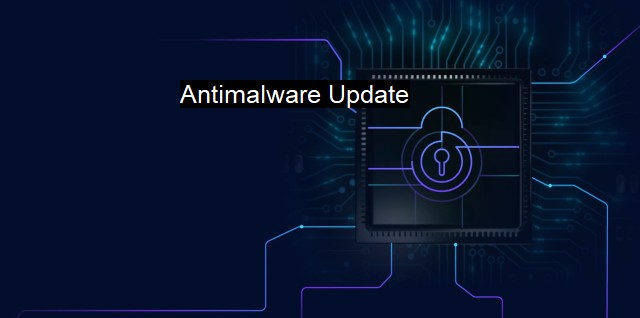What is Antimalware Update?
Why an antimalware update is essential for cybersecurity: Exploring the functions of signature files in protecting against malicious attacks on computer systems.
Antimalware, also known as antivirus software, is a type of computer software designed to prevent, detect, and remove malicious software, such as viruses, worms, trojans, ransomware, and other forms of harmful software that pose a threat to computers and networks. Maintaining the security of a computer system or network requires a dynamic, robust, and protective solution such as antimalware software.The term "antimalware update" refers to the process through which antimalware software is kept up-to-date with the latest developments in malware threats. This ongoing modification ensures that the antimalware software's database is current and effective against emerging and evolving malicious software entities.
Cybersecurity is a fast-paced field, with hackers and other cybercriminals continually evolving their strategies and developing innovative means of deploying malware. Traditional antivirus software may not be sufficient to deal with these emerging threats because these legacy systems use a static, signature-based approach that may only recognize and counteract malware threats with known signatures.
Consequently, the antimalware software cannot reliably protect your computer or network from new types of malware for which it has no knowledge. This vulnerability underscores the importance of antimalware updates, ensuring that the antimalware software is abreast with the dynamics of the ever-evolving cybersecurity landscape and equipped to deal with present and foreseeable threats.
Updating antimalware software involves the augmentation of malware identification rules and threat databases. These updates usually encompass new malware signature definitions that traditional antimalware software use for malware detection tactics and more recent heuristic algorithms that cater to newly discovered malwares.
The cyber world is teeming with a plethora of malware of different forms, structures, and sophistication levels. To shield against such a wide array of threats, software vendors make frequent updates to their antimalware solutions, taking advantage of the widespread sharing of specifics about identified malwares among security vendors.
In addition to updating the virus definition database within the software, antimalware updates also maintain the functionality of the software. This may entail upgraded features built onto the existing ones to simplify and enhance user experience, improved scanning algorithms for utile and resource-efficient functionality, and bug fixes to solve problems in the software’s earlier versions for improved performance.
These updates provide robust security enhancements that buffer the vulnerability of computer systems and fortify their defenses against malware threats. By regularly updating antimalware software, users essentially protect themselves from becoming victims of cybercrime.
Antimalware updates are crucial for keeping the software’s ability to detect and eliminate malware threats potent. Many software developers encourage and facilitate regular updates by providing them free of charge to existing licensed users of the product. They may also deliver them automatically to users who have chosen the autosave function provided by the software.
While antimalware programs are vestiges of digital security, they are not an absolute panacea against cyber threats. Complementary to using and updating these tools regularly, one should also exercise prudence in other aspects of digital hygiene, like cautious Internet browsing practices, refraining from opening suspicious emails or clicking unknown links, solid password practices, and backing up data regularly.
Antimalware updates function as the cornerstone of a comprehensive cybersecurity solution. They offer vital coverage against an extensive span of potential malign incursions hiding on the vast shelves of the internet, weaponizing the user's security stand against crippling viruses and malware assaults. Hence, failing to update one's antimalware software could have dire consequences, not least of which includes falling prey to the malevolent scheming of the nebulous world of cybercrime.

Antimalware Update FAQs
What is an antimalware update?
An antimalware update is an essential component of keeping your antivirus software current and effective. It is a software update that helps your antivirus program identify and remove new malware threats. These updates often include new virus definitions, bug fixes, and enhanced security features.Why is it important to keep my antimalware up-to-date?
Keeping your antimalware up-to-date is crucial for protecting your computer from new and emerging malware threats. Cybercriminals are constantly developing new types of malware that can evade outdated antivirus software. Up-to-date antimalware software is better equipped to detect and remove the latest malware threats.How frequently should I update my antimalware software?
It is recommended to update your antimalware software at least once a day to ensure that you have the latest virus definitions and security updates. Most antivirus programs have an automatic update feature that you can enable to make this process more convenient.What can I do if my antimalware software is not updating properly?
If your antimalware software is not updating correctly, there may be a problem with your internet connection or the antivirus software itself. First, check your internet connection to ensure that it is working properly. If that is not the issue, try restarting the antivirus software or restarting your computer. If the problem persists, contact your antivirus provider's customer support team for further assistance.| | A | | | B | | | C | | | D | | | E | | | F | | | G | | | H | | | I | | | J | | | K | | | L | | | M | |
| | N | | | O | | | P | | | Q | | | R | | | S | | | T | | | U | | | V | | | W | | | X | | | Y | | | Z | |
| | 1 | | | 2 | | | 3 | | | 4 | | | 7 | | | 8 | | |||||||